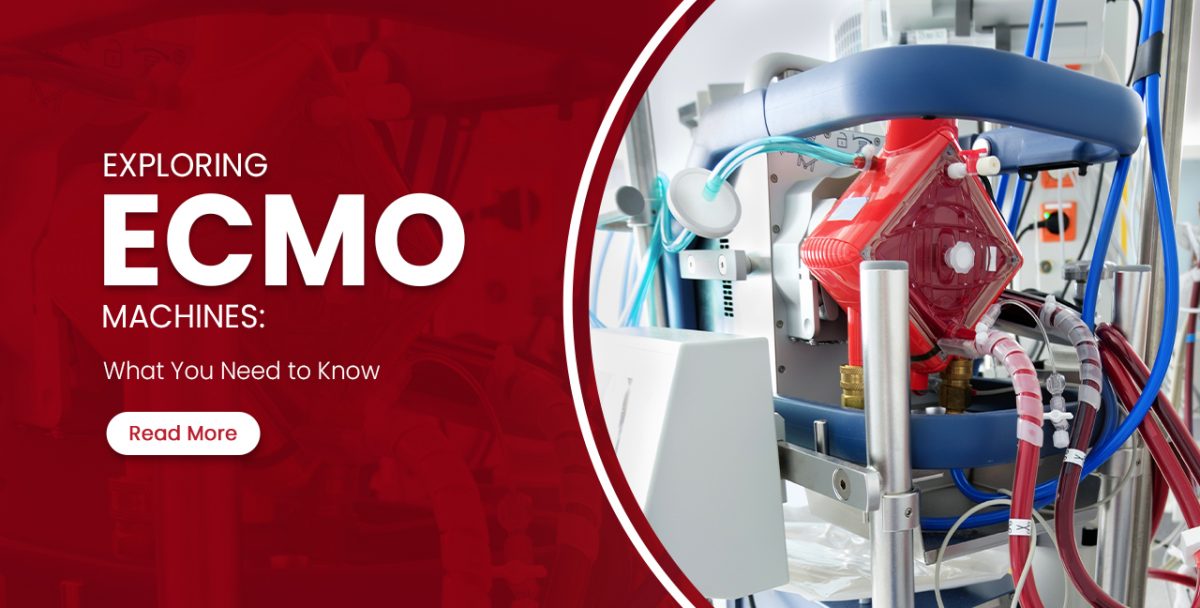Exploring ECMO Machines: What You Need to Know

What is ECMO?
ECMO (Extracorporeal membrane oxygenation), is a form of mechanical life support that can assist someone whose heart or lungs or both aren’t working properly. This process works through a series of devices that continuously pump blood out of your body, add oxygen, and remove carbon dioxide through an artificial lung menbrane. The blood is then pumped back into the body by the machine. In order to allow the heart and lungs to rest and recover from a severe respiratory infection, heart attack, or chest/ cardiac trauma, ECMO therapy can be extremely beneficial.
How Does ECMO Function?
People who are critically ill may benefit from an ECMO system because it can support their heart and lungs. These outcomes are possible as a result:
- Reduces the pressure on the heart and lungs, allowing these organs to recuperate.
- Sustains life when undergoing surgery or other medical procedures.
- Helps someone while they wait for a transplant.
- Helps babies whose lungs or hearts weren’t properly grown at birth.
Different Types of ECMO
There are two different ECMO therapies: venovenous (VV) ECMO, which only supports lung function, and venoarterial (VA) ECMO, which supports both heart and lung function.
VA ECMO
The mechanism works by allowing the majority of a patient’s blood to circulate through the circuit without passing through the heart. VA ECMO supports both the heart and lungs. VA ECMO allows oxygen-rich blood to flow through the body even when the heart is unable to pump it by taking blood from a major vein and returning it to a large artery.
VV ECMO
In this method, the patient’s heart must be capable of supporting the body as VV ECMO oxygenates blood but does not pump it. To allow blood to return to the body at one location and eliminate the necessity for two entry sites, two cannulas are inserted into veins near or inside the heart. Blood from ECMO comes back to the body prior to the heart pumping it all across the body.
When can ECMO Machines be used?
Major respiratory issues– Acute respiratory distress syndrome, which is caused by lung damage, reduces how well the lungs can absorb oxygen and remove carbon dioxide from the blood. This may occur when:
- Respiratory issues, including pneumonia, the flu, COVID-19′
- The lungs are damaged by sepsis.
- Injuries from inhaling and burns. The lungs can become damaged if you breathe in hot air from a fire, toxic gases, toxic chemicals, or smoke.
- Overdose on drugs.
- Pancreatitis. The body may emit chemicals and poisons due to pancreatic inflammation, which might harm the lungs.
- Ingesting water, liquids, food, vomit, or both, and drowning or aspirating these things into the lungs.
- Breathing problems.
Heart Problems – If you suffer cardiac damage from trauma or other illnesses or ailments, you might require ECMO treatment. A few of these are:
- Heart attack
- The heart muscle can become bruised and damaged by trauma, such as after a fall or automobile accident.
Infants – ECMO is frequently used to treat newborns and infants with heart and lung issues, particularly premature infants.
Operations and transplants
ECMO can act as a “bridge” until a patient can receive a particular kind of treatment or therapy. When a patient is awaiting a heart or lung transplant or during the following circumstances:
- Organ transplantation
- Lung and heart surgery
- Post-surgery recovery
- Organ donor’s support
Benefits of ECMO Machine
People who are critically ill may benefit from an ECMO system because it can support their heart and lungs. These outcomes are possible as a result:
- reduces the pressure on the heart and lungs, allowing these organs to recuperate.
- sustains life when undergoing surgery or other medical procedures.
- helps someone while they wait for a transplant.
- helps babies whose lungs or hearts weren’t properly grown at birth.

 Call-an-Ambulance
Call-an-Ambulance



